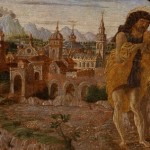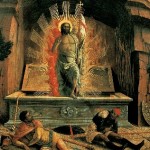What would you give to a doctor who told you, when someone you love is at the point of death, that he could cure him? That he would give him back his life – and not just for a few months hooked up to a roomful of machines and monitors – but that he would give back life in all its fullness?
Of course, our first thought is not to wonder how we would reward or think about such a doctor: our first thought is to disbelieve that such miracles can happen.
And yet I say to you that I know a physician who can restore the life of every one who has ever been dead or who has ever been at the point of death. I know someone who has the power over life and death – not like any earthly doctor. I know someone who can raise the dead and give them eternal life.
That someone, of course, is God.
In Ephesians Chapter 2, Paul is not only concerned with the resurrection of our bodies after they have died while on earth: he’s concerned with the eternal condition of our souls. Paul’s powerful prescription for the cure of death is indeed a miraculous and strong medicine; but first, he must make a very serious and deadly prognosis on every one who has ever been born into this world.
It is the oldest and deadliest disease known to man that Paul has in mind, and the prescription he makes is the most powerful and most famous in history: for his message in Ephesians 2:1-10 is very simple: you were dead in your sins, but God has made you alive through Jesus Christ.
Many people have attempted to explain the mystery of mankind – how he can act so nobly sometimes and create the most beautiful works of art and yet is capable of the greatest evil and harm. Most people today would say that men do wicked things because of their environment. Rousseau believed that man was born free but everywhere we see him in chains. He believed that man was basically good but that society corrupted him.
The problem with this and all similar arguments is that what is society but a collection of humans in community. How can each one be good but together they are corrupt and wicked? It makes no sense.
The apostle Paul – indeed the Scriptures in their entirety – have a vastly different belief about man and his natural condition. For St. Paul preaches that we were dead in our trespasses and sins. Let me say it again: you were dead in your sins (verse 5).
Apart from the grace of God, we live for ourselves and not God; we love ourselves and not God; every day we break God’s commandments, each of which carries the penalty of death, because we have violated a holy and perfect God.
There’s simply no way to sugar coat this. God’s Word is completely clear on this matter. You – meaning you, I, and everyone who’s ever lived (with one exception) – were born in sin, and the wages of sin is death (Romans 6:23).
Paul doesn’t tell you that you were a little sick but went into spontaneous remission: he plainly says that you were dead because of your trespasses and sins. He refers to 3 things that we have followed into sin and death, 3 things that the Church has traditionally categorized as “the world, the flesh, and the devil.” In verse 2 he mentions both the world and the prince of this world, and in verse 3 he mentions the desires of the flesh. All 3 of these lead us into temptation, into sin, and ultimately into death. And this was our natural condition, before God reaches down to save us.
St. Paul is hardcore. As if this weren’t bad enough, he says in verse 3 that we were “by nature children of wrath.”
You were dead in your sins and were by nature children of wrath BUT GOD. These are two of the shortest words in the Bible, but also two of the most dramatic: BUT GOD.
But God what? BUT GOD who is rich in mercy made us alive in Christ (verses 4-5.) By the grace of God – and entirely by the grace of God – we find relief, deliverance and salvation from the miserable condition that I just discussed.
How has God done this?
In 3 simple words, all of our life’s problems are answered by God: union with Christ.
It’s by being united with Jesus Christ that you’re set free from enslavement to the world, the flesh, and the devil; it’s by being united to Jesus Christ that you’re justified before a holy God; and it’s by being united with Jesus Christ that you’re made alive to God.
If you’re a disciple of Jesus Christ, then you’re truly united with Christ – made one with Him. In this passage Paul tells us that God saves us by uniting us with His Son in 3 real ways. In verse 5, we learn that God “made us alive together with Christ,” that is, we are united with Him in His Resurrection. In the first part of verse 6 we hear that we are raised up with Him in the heavenly places or united with Him in His Ascension. And in the second part of verse 6 we are taught that He “made us to sit in the heavenly places in Christ Jesus,” that is, that we are united with Jesus Christ in His Session, his sitting and ruling at the right hand of the Father (I could do a whole meditation just on this one verse!)
Truly, God has blessed us with every spiritual blessing in the heavenly places, for He has made us one with His Son, and this has delivered us from death, bondage to sin, and damnation.
But why? Why would God offer to take away the sins of the world?
Because He is “rich in mercy” (verse 4) and love.
Given our being dead in sin and being by nature children of wrath, the only possible source of salvation is God and His grace. Grace, by its nature, is a gift. It’s God’s Christmas present to you, through His Son made flesh.
You were saved by God’s grace because you were dead to God and could not save yourself.
The world is filled with pictures of people into whose life God has poured His grace.
One such picture is the life of John Newton, who was born in 1725 in England. He spent his early life turning to religion, only to fall back from it again. He read a work which taught that you could believe anything about God you wanted to. Slowly, this acted like a poison in his soul, and he gradually became a very corrupt man, tempting and seducing others into evil. Newton’s later testimony was that he was “big with mischief, and, like one infected with a pestilence, was capable of spreading a taint wherever I went.”
He became a slave trader, and in March 1748, while on ship, he awoke suddenly to the force of an extremely violent storm. Adrift at sea for four weeks, he read parts of the New Testament and began to cry to the Lord, understanding that only He could relieve his plight.
By the time they reached land, Newton had recovered his belief in God and his grace. John Newton is, of course, most famous today for having written the following words,
surely thinking of how God had saved him in both the storm at sea and in the storm of his life:
“Amazing grace, how sweet the sound
that saved a wretch like me,
I once was lost, but now am found
was blind, but now I see.”
It may not be that any of you has had God work so dramatically in your life – I
know He hasn’t in mine. And yet this is a picture of the grace that has already operated in the life of every true believer in Jesus Christ.
What would you give to a God who gave you back your life when you didn’t deserve it?
The answer should be obvious: you give Him back your entire life: body, mind, and soul!
Prayer: Thanks be to You, O Lord, because when I was dead in my sins You showed me mercy and saved me by Your grace. Remind me today and every day of Your amazing grace that I may return to Your holy Temple and give thanks. Give me the grace to do the good works for which I was redeemed in Jesus Christ. Amen.
Resolution and Point for Meditation: I resolve to meditate today on God’s grace in my life and to find one specific way to respond to His grace. Some possible options are:
- Singing a hymn, such as “Amazing Grace”
- Continuing in one good work you have begun in a prior resolution, remembering that you were “created in Christ Jesus for good works” (verse 10).
- Remembering your former life or what your life would be without the grace of God. Try to find things in your life today that remind you of this. Each time you are reminded of God’s grace, offer up a brief prayer of thanksgiving.
© 2015 Fr. Charles Erlandson
















